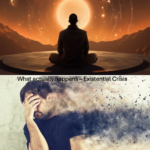Navigating the Depths of an Existential Crisis
“I believe it is one of the greatest crises, a moment of the deepest self-reflection of humanity. Whether man recovers from it, whether he becomes master of this crisis, is a question of his strength.” ~ Friedrich Nietzsche
An existential crisis can be one of the most disorienting and profound periods of our lives. It is a moment when we are confronted with deep questions about the nature of existence, purpose, and the meaning of life itself. Such crises can be sparked by significant life changes, losses, or simply the introspective realization of our mortality and the vast, often uncertain universe we inhabit. While these moments can be overwhelming, they also offer an opportunity for growth, self-discovery, and a deeper understanding of the human condition.
The Nature of an Existential Crisis
Jean-Paul Sartre once said, “Everything has been figured out, except how to live.” This statement captures the essence of an existential crisis: the realization that despite all the knowledge, achievements, and societal structures, we are often left with fundamental uncertainties about our existence. This experience can lead to feelings of anxiety, dread, and disconnection, as we question everything from our daily routines to our deepest beliefs.
Existentialist philosopher Søren Kierkegaard referred to this state as “the dizziness of freedom.” According to him, humans are thrust into a world where we must choose our paths, yet we are overwhelmed by the sheer number of possibilities and the responsibility that comes with each choice. It is this freedom, both a blessing and a curse, that can trigger a crisis of meaning.
Finding Meaning Amidst Suffering
While an existential crisis can feel like a descent into darkness, it can also pave the way for profound personal growth. Viktor E. Frankl, a psychiatrist and Holocaust survivor, emphasized the importance of finding a purpose, even amidst suffering. He famously said, “He who has a why to live can bear almost any how.” Frankl’s experience taught him that even in the most difficult circumstances, the pursuit of meaning can provide the strength to endure.
This perspective is echoed in Friedrich Nietzsche’s assertion: “To live is to suffer, to survive is to find some meaning in the suffering.” The acknowledgment of suffering as an inevitable part of existence invites us to explore ways to transcend it. Instead of avoiding or denying these experiences, embracing them allows us to find a purpose that aligns with our values and aspirations.
The Burden and Freedom of Choice
One of the core aspects of existential crises is the realization of our freedom to shape our lives. Sartre famously remarked that “Man is condemned to be free,” highlighting the paradox of human existence: while we crave freedom, we are also terrified by the burden it places upon us. The responsibility for defining our path, values, and beliefs rests squarely on our shoulders, and this realization can lead to profound anxiety.
In a similar vein, Franz Kafka said, “I am free, and that is why I am lost.” His words underscore the challenge of navigating life’s infinite possibilities. Yet, it is through this very freedom that we can carve out a unique existence, building a life that resonates with our truest selves.
Embracing the Journey Within
While existential crises often feel isolating, they are also a natural part of the human journey. The poet Rainer Maria Rilke advised, “Be patient toward all that is unsolved in your heart and try to love the questions themselves.” His suggestion is to accept the uncertainty and the unknown as integral aspects of life, rather than something to be feared or resolved hastily. In doing so, we can cultivate a sense of inner peace and openness to the evolving nature of our existence.
Carl Jung echoed this sentiment with his belief in the transformative power of self-acceptance. He stated, “The most terrifying thing is to accept oneself completely.” This process of self-acceptance is not about solving every problem or finding definitive answers. Rather, it is about embracing our complexity, our freedom, and our potential for growth.
The Path Forward: Creating Meaning
Existential crises challenge us to look beyond external structures and expectations, urging us to explore what truly matters to us on a personal level. Albert Camus, a philosopher of absurdism, offered a powerful reminder: “In the midst of winter, I found there was, within me, an invincible summer.” This quote encapsulates the resilience that can arise from within when we face life’s uncertainties head-on.
In navigating an existential crisis, it can be helpful to seek meaning in the everyday, focusing on small moments of joy, acts of kindness, and connections with others. Simone de Beauvoir encouraged action without delay, saying, “Change your life today. Don’t gamble on the future, act now, without delay.” In other words, the search for meaning is not about finding grand answers but about engaging actively with the world in ways that align with our deepest values.
Conclusion
An existential crisis, though often marked by discomfort and confusion, is a profound invitation to explore the depths of our inner world and the nature of existence itself. Through the words of philosophers and writers, we find that such crises are not signs of failure or weakness but rather an essential part of the human experience. They challenge us to confront our fears, embrace our freedom, and seek out the meaning that resonates with our authentic selves.
As we journey through the crisis, we may come to realize, as Rilke and others have suggested, that it is not the definitive answers that provide peace but the courage to live with the questions and uncertainties. In this process, we begin to carve out a path of meaning, purpose, and inner strength that sustains us through life’s challenges.

